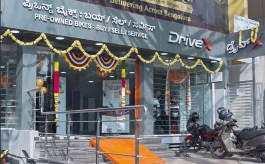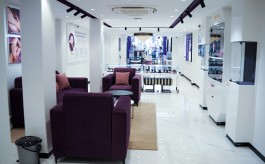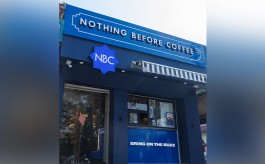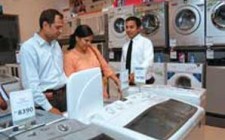Safety on the radar
November 17, 2015
Odomos and Good Knight battle it out with high decibel campaigns, trendy packaging and product innovations in the hunt for market share
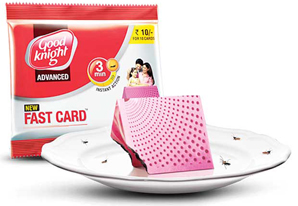 As dengue takes on epidemic proportions in the country, two old brands are using the country's worsening public health crisis as an opportunity to propel themselves on to a larger stage. Odomos, from the house of Dabur and Good Knight from Godrej Consumer Products Ltd (GCPL) have changed their communication strategies, introduced innovative products, changed their pack sizes and adopted new technology to win customers over to their side. While both brands are looking at natural, easy to use and odourless products, Good Knight is using television and print to get its message across to its target audience of mothers and children and Odomos has put its weight behind BTL (below the line) promotions and a school-to-school awareness drive.
As dengue takes on epidemic proportions in the country, two old brands are using the country's worsening public health crisis as an opportunity to propel themselves on to a larger stage. Odomos, from the house of Dabur and Good Knight from Godrej Consumer Products Ltd (GCPL) have changed their communication strategies, introduced innovative products, changed their pack sizes and adopted new technology to win customers over to their side. While both brands are looking at natural, easy to use and odourless products, Good Knight is using television and print to get its message across to its target audience of mothers and children and Odomos has put its weight behind BTL (below the line) promotions and a school-to-school awareness drive.The two brands are old rivals; Odomos is a 40-year old brand while Good Knight made an appearance in the Indian market in 2000 and the two define themselves differently although they are targeting the same audience. (Odomos is positioned as a mosquito repellent and Good Knight is a mosquito and insect repellent) At present Good Knight has some 40 per cent share of the Rs 3,700 crore organised market and Odomos has 85 per cent of the repellent cream market in India.
Over the last couple of months the two brands have ramped up their marketing and promotional activities. As fear of mosquito borne diseases increases, demand for repellents is only expected to go higher and higher and the brands are keen to raise the pitch and establish their brand identities firmly in the consumer's mind. "Given the dengue outbreak, demand for safe mosquito repellents like Odomos, have been on the rise. Consumers are now increasingly seeking safe products to prevent themselves from mosquito bites, resulting in a spurt in sales", a Dabur India spokesperson said.
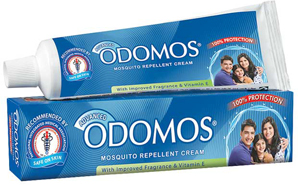 Consumers also want products that look and smell good. Dabur has introduced wearable mosquito repellents under its Odomos brand to woo the kids, for instance. The idea is to make the brand trendy and appealing, experts say. Good Knight, for instance has introduced neem based repellents, and repellent strips that can be burnt (instead of foul smelling coils). It also has Good Knight Aerosol - a mosquito and flies repellent or killing spray.
Consumers also want products that look and smell good. Dabur has introduced wearable mosquito repellents under its Odomos brand to woo the kids, for instance. The idea is to make the brand trendy and appealing, experts say. Good Knight, for instance has introduced neem based repellents, and repellent strips that can be burnt (instead of foul smelling coils). It also has Good Knight Aerosol - a mosquito and flies repellent or killing spray.GCPL has launched a year-long campaign 'Subah Bolo Good Knight' that seeks to increase the duration of use for their products. It targets the parents and elderly in the families, persuading them to use repellents even during the morning which is when the dengue spreading mosquito hunts its prey. The campaign is being conducted via television commercials, print and digital ads and through activation programmes in schools. Godrej's campaign aims to reach out to over 10 million school-going kids across the country says Sunil Kataria, business head, India and SAARC, GCPL.
The GCPL campaign is based on a joint survey the company did with Nielsen which showed that nearly 70 per cent of the parents surveyed believed that there is a higher likelihood of dengue spreading through schools than at home and 87 per cent believe that dengue is life threatening. The survey also showed that only 10-15 per cent of the families surveyed used repellents in the morning and that is what led to the messaging in its ongoing campaign for which the company has allocated Rs 25 crore for the year. While, it is not promoting its products directly through the campaign, Kataria says, "The company will benefit automatically as the consumers benefit by using its products more. We are not selling a product, rather focusing on thought leadership."
Both brands, interestingly, have decided to focus on awareness building. Odomos is doing this through BTL promotional measures. GCPL has launched a mobile app called 'track the bite' which provides information on various aspects of the disease and its prevention. "We have undertaken aggressive initiatives to convey the benefits of Odomos and how it is clinically proven for protection against mosquitoes that cause dengue.
We are also running a social campaign along with National Integrated Medical Association (NIMA) which is aimed at preventing school-going children across India from falling prey to the deadly disease," a spokesperson for Dabur said.
Under this initiative, aimed at equipping children with knowledge about dengue, the team from Odomos, along with healthcare professionals from leading hospital chain Apollo Hospitals, has been visiting schools across cities. "We will also award the best schools that take extensive care to keep their school dengue free under the initiative, christened Dengue Fighters," a Dabur India spokesperson said. The real test however would be if the brands can walk the talk on cleanliness and hygiene even as they manage to improve their bottomlines.
Advertisement

